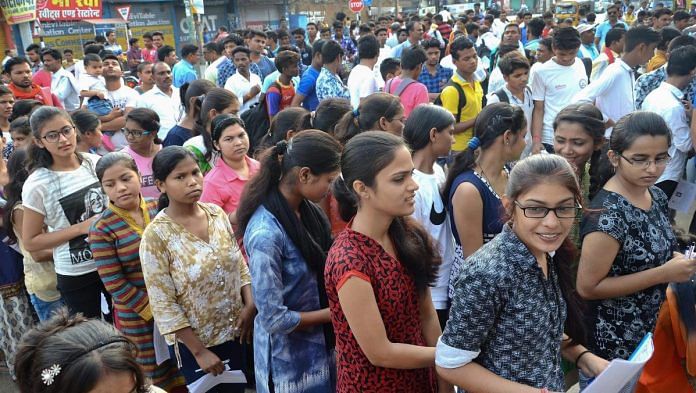The latest data has found only 8% of over 13 lakh aspirants wrote the medical entrance exam in regional languages, with a vast majority using English.
New Delhi: The government is likely to rethink the number of regional languages that aspirants can give the National Eligibility Entrance Test (NEET) in, since the medium of instruction later has to be English.
The move comes after a slight dip was observed in the number of aspirants taking the medical entrance test in regional languages this year compared to the last. As per latest data from the CBSE, which conducts NEET, over 10 lakh of the 13,26,725 students who appeared for the exam this year used English, around one lakh used Hindu, while the rest used other languages like Assamese, Gujarati, Marathi, Tamil, Oriya, Bengali, Urdu, Telugu and Kannada.
In percentage terms, the number of candidates appearing in regional languages has dropped from 10 per cent to 8 per cent, with Oriya and Bengali seeing the biggest fall. Among the regional languages, the most popular medium remains Gujarati, while Urdu, the latest to enter the fray after a petition in the Supreme Court, found only 1,700 takers.
Decision will take some time
“There was a huge demand from various states for including regional languages in NEET, since many states conducted their own medical entrance exams in their respective languages before it became centralised,” a senior official in the Directorate of Health Services said.
“However, if the numbers in regional languages are not many and students start getting comfortable with English, we might just revert to English,” the official said.
Some regional languages, however, have to be included because the Supreme Court had given an order to this effect, the officer clarified.
“We will see how it goes, and take a decision on the languages in the coming years,” the official said.
“This is only until the entrance examination level. Once a student is selected to a college, he/she will have to study in English only. For students from regional languages, the Medical Council of India will have a two-month foundation course to make them familiar with some terms which they might be unfamiliar with.”
Equal footing
Even as the government rethinks the issue, people who teach in regional languages say it is a way to provide equal footing to students.
Pankaj Baldi, who has taught medical aspirants in Gujarat for the last 18 years, said: “Writing an exam in a regional language only gives an ease of access to students who have studied in Gujarati language most part of their schooling. For them, it will be difficult to completely switch to English in Class 10 and 12. Though they also know many terms in English, they are more comfortable in their mother tongue.”
Asked why so many Gujaratis give the NEET exam in their language, Baldi explained: “Gujarat used to conduct its state medical examination in Gujarati, and had 90 per cent reservation for students coming from the state board. This is why most parents preferred their children to study in their regional language. The same trend has spilled over to the national level.”




Is Hindi not a regional language? It is also a regional language.